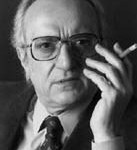 The death of distinguished historian Eugene D. Genovese on September 26 led me to reflect on both his scholarly accomplishments and his intellectual and political thought. No book inspired me more as a graduate student than Genovese’s Roll, Jordan, Roll (1975), but Genovese’s sharp turn to the right in his later years was troubling indeed.
The death of distinguished historian Eugene D. Genovese on September 26 led me to reflect on both his scholarly accomplishments and his intellectual and political thought. No book inspired me more as a graduate student than Genovese’s Roll, Jordan, Roll (1975), but Genovese’s sharp turn to the right in his later years was troubling indeed.
Genovese was the son of dockworker in Brooklyn, and he briefly belonged to the Communist Party as a young man. He earned a Ph.D. from Columbia, worked at a half dozen major universities, and served as President of the Organization of American Historians from 1978-79. Roll, Jordan, Roll superbly captured the way slaves struggled (and largely succeeded) in maintaining their humanity. The book was awarded the Bancroft Prize in history, and in 1994 Edward Ayres called it “the best book ever written about American slavery.”
A dozen books followed, some co-written by Elizabeth Fox-Genovese, Genovese’s wife and fellow historian, and the best of these books utilized a Marxist-feminist perspective to illuminate the pre-Civil War South. But in the mid-1980s Genovese abandoned his prior critical alignment. He deplored “political correctness” among historians, and he opposed abortion rights, argued religion should be taught in the public schools, and expressed tolerance for discrimination against gay men and lesbians. Conservative Republican Pat Buchanan became his favorite political figure.
What can we make of this? How does one change from being a leading voice for liberation and empowerment to being a champion of inequality and social control? Perhaps there is a danger that a critically minded man or woman – a person who struggles against the dehumanizing hegemony of western social life – can be beaten down and succumb to intellectual crankiness. I know from my own experience that an intellectual outside the mainstream spends a great deal of time alone with his or her own thoughts. Those thoughts can get twisted and turned upside down. It was sad to see where Genovese’s journey ended.

For an unpatronizing counterpoint, see Mark Bauerlein in the Chronicle of Higher Education. http://chronicle.com/blogs/conversation/2012/09/28/on-eugene-genovese/
It is also worth noting that another Marxist intellectual icon of the 1970’s, British historian Eric Hobsbawm, passed away on October 1 (at age 95), only five days after Eugene Genovese.
Hobsbawm’s Age of Capital: 1848 to 1875, the second volume of his three volume history of industrial capitalism, appeared in 1975, only two years after Genovese’s Roll, Jordan, Roll.
Whatever one’s political persuasion, if you were in graduate school at the time, or if you were just an academically oriented law student, these were two works that had to be read.
So far as I know, even though Hobsbawm left the Communist Party in 1991, he remained a Marxist true believer until the end.
Genovese and Hobsbawm both dreamed of a fairer, more just world. Surely there is a place in Heaven for such people.
“Surely there is a place in Heaven for such people.”
Might depend on Hobsbawm’s answer if St. Peter asks “didn’t you know what Deutscher and Orwell knew?” Genovese can point to his “The Question”, Dissent (Summer 1994).